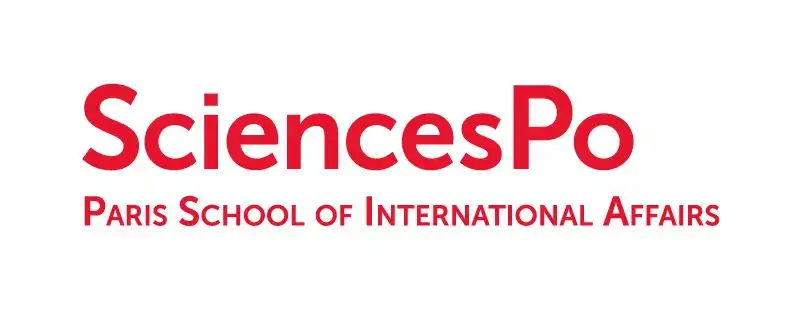Home>Meet the Winners of the 2025 Master Thesis Prize Technology, Global Affairs, and Public Policy
23.10.2025
Meet the Winners of the 2025 Master Thesis Prize Technology, Global Affairs, and Public Policy

The PSIA Technology and Global Affairs Innovation Hub, the School of Public Affairs, and the Open Institute for Digital Transformations are thrilled to announce the recipients of the inaugural Master's Thesis Prize on Technology, Global Affairs & Public Policy.
On 7 October, students, faculty members, and loved ones gathered in the Salons scientifiques to celebrate the excellence of master-level research at Sciences Po and honour the exceptional scholarship of our winners, Lola Pottier (School of Public Affairs) and Markus Bencsits (PSIA).
A Successful Inaugural Edition
This first edition of the Prize proved remarkably competitive, drawing impressive participation from the talented students of the Paris School of International Affairs (PSIA) and the School of Public Affairs. More than 10% of students who presented a master's thesis in the past year entered the contest, submitting outstanding work that explored, with a variety of disciplinary and methodological angles, the complex intersections of technology, public policy, and international affairs.
The Prize was established to recognise excellence in research that examines how new technologies are transforming our world—whether as forces advancing global goals, shaping new public policy agendas, addressing emerging diplomatic challenges, or generating novel societal and regulatory issues requiring innovative policy responses.
Celebrating Our Distinguished Winners
After careful deliberation, a distinguished jury composed of Jean-Philippe Cointet (Medialab - Open Institute for Digital Transformations), Ronja Sczepanski (CEE), Damien Bol (CEVIPOF), and Emiliano Grossman (CDSP - CEE) selected two exceptional theses that exemplify scholarly excellence and policy relevance.
I joined Sciences Po’s Master in European Affairs, Europe in the World track, after completing a licence degree in organisational and social sciences at Dauphine University. Being a fundamentally curious person, I have strived throughout my academic path to cross disciplines and perspectives to better understand the world.
During my Master’s, I grew increasingly passionate about the political impacts of digital technologies on societies, political systems and individual behaviour, particularly through their influence over the production and reception of information. This is a topical subject worldwide, including for the European Union. Not only have digital services been largely regulated in the past years by European lawmakers, but they have also been core issues of diplomatic relations between the EU and its neighbours. Many controversies have related to social media, who on the one hand hold an exceptional position over information consumption but on whom, on the other hand, little information and control is yet available.
In this context, I chose to write a thesis that investigates whether a specific European regulation, the Digital Services Act (DSA), is effective in attaining its stated goal of mitigating digital platforms’ asymmetrical power. Specifically, I assess the extent to which the DSA is effective in increasing transparency in social media platforms, taking the case study of Meta Platforms. After theorising the notion of transparency, I use mixed methods (including programming and corpus analysis) to analyse the DSA’s relevant provisions one by one. Overall, I find that the DSA did increase transparency at Meta but not equally across transparency’s individual, aggregated, and systemic levels.
This experience has been enriching in many regards. Not only did it allow me to conduct public policy analysis myself and thereby contribute to the improvement of the DSA, but it also allowed me to fundamentally improve my research skills. Crucially, writing this thesis has confirmed my taste for scientific investigation and analysis, and I am eager to keep on studying the evolution of the digital world.
I'm originally from Vienna, Austria. I hold a Master's degree in International Economic Policy from PSIA and I have a strong interest in applied economics and environmental policy.
In my Master’s thesis, I examined the relationship between financial incentives for electric vehicles (EVs) and clean innovation in the automobile industry. I drew inspiration for this research during an internship at the OECD.
I currently now works in management consulting in Vienna.
During the ceremony, both Lola and Markus presented their research and engaged in stimulating discussions with the jury and audience, demonstrating not only the depth of their scholarship but also their ability to elegantly communicate complex ideas to diverse audiences.

Honourable Mentions
The jury also wished to recognise three additional outstanding submissions that merited special acknowledgment for the remarkable quality of their theses:
- Giovanni Maggi (EAP) for “Structuring the Public Debate. Party-press alignment and discursive polarization in the French immigration and climate change debate”,
- Barbora Bromova (EAP) for "Negotiating Artificial Value - A Landscape of Actors and Discourses Shaping Artificial Intelligence for Public Interest",
- Emma Schwentner (PSIA) for "Climate Change Mitigation Policy Diffusion. A network approach to examining diffusion of climate change mitigation policies across high emitting countries".
While there could be only two winners, these impressive works demonstrate the breadth and quality of research being conducted by our students on critical contemporary challenges at the intersection of technology and policy.
Looking Forward
Each winning thesis will be published on Sciences Po's official websites, and the recipients have been awarded prizes valued at 500 euros each. Their research will serve as inspiration for future cohorts and contribute to ongoing academic and policy conversations about technology's role in shaping our global future.
We extend our warmest congratulations to Lola and Markus, as well as to all nominees whose work reflects the exceptional caliber of scholarship at the Paris School of International Affairs (PSIA) and the School of Public Affairs (EAP). We hope their work will inspire many students to emulate them and dedicate part of their final year at Sciences Po, researching with innovating methods the intersection of technology, global affairs, and public policy, as this inaugural ceremony marks only the beginning of the annual Prize.
Got a question? Interested to be involved in the Hub?
If you wish to contact the team, feel free to email us at innovationhub.psia@sciencespo.fr
